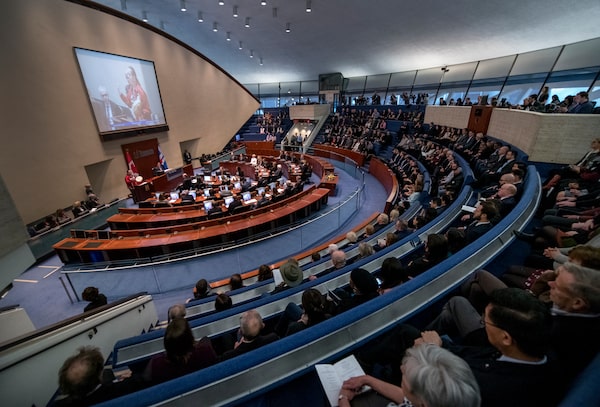
Toronto city council on Dec. 4, 2018.Fred Lum/the Globe and Mail
Toronto City Council has passed an annual budget that includes a minimal property tax increase and will need around $650-million in support from other levels of government to achieve balance.
The 2021 budget approved Thursday is the city’s first since the COVID-19 pandemic blew a hole in municipal finances across the country.
Ottawa and Queen’s Park came through last year with enough money to paper over the budget shortfall that emerged in Toronto during 2020. But amid continuing pandemic effects, which Toronto Mayor John Tory called “the worst crisis ever faced by the city,” the 2021 budget includes another yawning hole.
“Our budget is going to be one that I think matches the unprecedented times in which we find ourselves,” Mr. Tory told reporters before the council debate. “It preserves and protects city services … and it invests more in key areas.”
There were a variety of votes aimed at quality-of-life improvements.
Councillors directed staff to report back later this year on winterizing public toilets and doing winter clearing of some park and ravine paths. Staff will look at improving library services and venues for skateboarding and BMX bikes.
The budget also includes a freeze on transit fares and council approved a one-year reduction in licence renewal fees for taxi and limousine drivers.
However, there were councillors who lamented the lack of significant movement on some of the large issues facing the city.
“The much-needed transformation of policing, with respect to mental health and homelessness and substance use and policing of our racialized communities, is not reflected here, still, despite all the outcries,” said Councillor Joe Cressy, who chairs the city’s board of health.
The 2021 budget includes a 0.7-per-cent residential property tax increase. Also rising this year is a city-building levy. This tax, which is dedicated to building transit and affordable housing, is going up by its previously scheduled annual increase of 1.5 per cent.
Together, the two increases mean that the average home-owner will pay an additional $69 this year.
“The budget that we have in front of us … does not build back better,” said Councillor Gord Perks. “It does not create the economic opportunities that are necessary to make sure that we don’t end up in a long depression.”
Canadian cities have few ways of raising revenue and Toronto has become increasingly reliant on a land transfer tax on home sales. To close its budget gap, the city is seeking money from the provincial and federal governments.
According to city staff, the 2021 budget shortfall amounts to $649-million. That gap had previously been pegged at $856-million but has been reduced owing to a number of provincial funding announcements. Some 2020 city spending was also reassessed, allowing money to be shifted to the 2021 budget year.
By law, the city cannot pass a budget that is out of balance. The contingency plan, if higher levels of government don’t come through with the $649-million, is to close this gap by tapping reserves and redirecting operating dollars that would otherwise be funnelled to the capital plan.
Mr. Tory, who ran for office on a promise to keep property taxes at or below inflation, on Thursday derided big rises in tax on home-owners as “the easy way out.” And he warned that the city taking on more debt would simply create a bill to be paid in the future.
 Oliver Moore
Oliver Moore